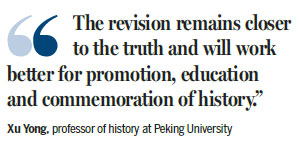China’s top education authority has implemented a revision of textbooks on the length of the country’s war against Japanese aggression, as supported by scholars and the public.
The Ministry of Education last week urged education departments across the country to revise textbooks for primary and secondary schools by extending the official period of the war from eight to 14 years.
In previous textbooks, the Chinese War of Resistance Against Japanese Aggression lasted for eight years beginning on July 7, 1937, after Japanese troops bombed Lugou Bridge and Wanping county in southwest Beijing, and ending on Aug 15, 1945, when Japan declared its unconditional surrender.

In the revised version, the start of the war began on Sept 18, 1931, when Japanese troops blew up a section of railway in Shenyang, Liaoning province, and attacked the Chinese garrison quartered in the city, the beginning of its occupation of China’s Northeast region.
The revision has been finished and the new textbooks will be used from the 2017 spring semester onward, Beijing News reported on Tuesday, quoting an unnamed official from the ministry’s basic education department.
Citing the significance of restoring history, some Chinese scholars and observers have called for a redefinition of the beginning and length of the war.
Xue Gang, a Beijing-based volunteer researcher who specializes in Chinese history during World War II, applauded the revision for better educating younger generations.
“It should’ve been done earlier. The July 7 Incident in 1937 was the beginning of China’s nationwide full-scale war against the Japanese invasion, but the fight of regional resistance actually begun much earlier in 1931,” Xue said on Tuesday.
“That part of history, from 1931 to 1937, of people and garrison soldiers in Northeast China fighting against Japanese aggressors despite struggle and sacrifice had been neglected for a long time. It’s time to teach younger generations the full history,” he said.
Xu Yong, a professor of history at Peking University, agreed, citing the importance of acknowledging and commemorating the contribution of people who stood up against the invasion during that period.
“According to a comprehensive study on historical material and documents, the revision remains closer to the truth and will work better for promotion, education and commemoration of history,” he said.
To commemorate the 85th anniversary of the September 18 Incident in Shenyang in 2016, Vice-Premier Liu Yandong struck a bell 14 times, representing the 14 years of Chinese people’s fight against Japanese aggressors.


